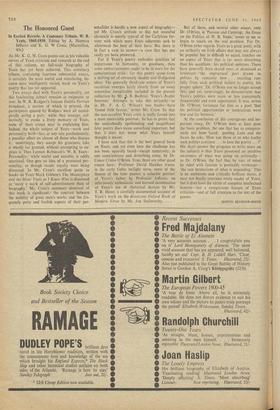The Honoured Guest
In Excited Reverie. A Centenary Tribute. W. B. Yeats, 1865-1939. Edited by A. Norman Jeffares and K. G. W Cross. (Macmillan, 45s.) As Mr. K. G. W. Cross points out in his valuable survey of Yeats criticism and research at the end of this volume, no full-scale biography of Yeats has yet been achieved. This centenary tribute, containing fourteen substantial essays, is certainly the most useful and stimulating, be- cause most intelligently varied, book on Yeats's poetry that has yet appeared.
Two essays deal with Yeats's personality, yet this fascinating subject remains as enigmatic as ever. In W. R. Rodgers's famous Dublin Portrait broadcast, a section of which is printed, the participants quoted by Rodgers were all nostal- gically acting a part: while they manage, col- lectively, to evoke a lively memory of Yeats, none of them comes near to explaining him. Indeed, the whole subject of Yeats—work and personality both—has, at any rate posthumously, a peculiar effect on almost all those who discuss it: unwittingly, they accept his greatness, take it wholly for granted, without attempting to ex- plain it. Thus Lennox Robinson's 'W. B. Yeats: Personality,' while useful and amiable, is oddly uncritical. One gets an idea of a protected per- sonality; as though recent royalty were being discussed. In Mr. Cross's excellent guide to books on Yeats Mark Gibbon's The Masterpiece and the Man: Yeats as I Knew Him is dismissed as 'more a work of self-advertisement than of biography.' Mr. Cross's summary dismissal of this book is significant: the contrast between the nobility of great men's works and the fre- quently petty and foolish aspects of their per- sonalities is hardly a new aspect of biography— yet Mr. Cross's attitude to this not unuseful chronicle is merely typical of the Carlylean fer- vour with which most Yeats adherents seek to whitewash the bust of their hero. But there is in fact a case to answer—a case that has not really yet been answered.
For if Yeats's poetry embodies qualities of importance to humanity, to goodness, then some embarrassments ought to be in store for the conscientious critic: for this poetry arose from a shifting set of extremely shoddy and ill-digested ideas. The generally third-rate nature of Yeats's occultism emerges fairly clearly from an essay somewhat inexplicably included in the present collection by Mr.. B. Bushrui, `Yeats's Arabic Interests.' Attempts to take this seriously—as in Mr. F. A. C. Wilson's two books—have 'found little favour,' writes Mr. Cross. So that the non-occultist Yeats critic is really forced into a most unenviable position : he has to prove that the undoubtedly spellbinding and magnificent later poetry does mean something important, but that it does not mean what Yeats himself thought it meant.
1 have said that this is the best general book on Yeats, and yet even here the challenge has not been squarely faced—except tentatively, in one conscientious and disturbing essay, by Dr. Conor Cruise O'Brien. True, there are other good essays here: Professor David Daiches traces, in the early Celtic twilight verse, some of the themes of the later poems; a valuable portrait of Yeats's father by Professor Jeffares; an infectiously enthusiastic and learned examination of Yeats's use of rhetorical devices by Mr. T. R. Henn; a carefully documented account of Yeats's work on the disastrous Oxford Book of Modern Verse by Mr. Jon Stallworthy. . . . But of these, and several other essays, only Dr. O'Brien, in 'Passion and Cunning: An Essay on the Politics of W. B. Yeats,' seems to me to begin to touch on the real problem. For Dr. O'Brien (who regards Yeats as a great poet), with an authority on Irish affairs that may not always be popular but is difficult to equal, touches on an aspect of Yeats that is far more disturbing than his occultism: his political opinions. These have generally been skated over, or dismissed as irrelevant—`the impractical poet drawn to politics by romantic love . . . recoiling rue- fully from each political failure to poetry, his proper sphere.' Dr. O'Brien can no longer accept this; and yet, surprisingly, he demonstrates that Yeats's politics were more or less consistently disagreeable and even opportunist. It was, writes Dr. O'Brien, fortunate for him as a poet 'that his political opportunities or temptations were few and far between.'
At the conclusion of this courageous and im- portant essay, Dr. O'Brien does at least pose the basic problem, the one that has so conspicu- ously not been faced : quoting Leda and the Swan, he asks, 'How can those of us who loathe such politics continue ... to love the poetry ...?' His short answer (he proposes to write more on the subject) is that Yeats possessed an intuitive awareness of what was going on politically— to Dr. O'Brien, the fact that by cast of mind he sided with fascism is poetically irrelevant— 'the raw intimations of what is impending.' This is an ambitious and critically brilliant thesis; it may not finally convince every reader of Yeats, but it does have the virtue of complete intellectual honesty—not a conspicuous feature of Yeats criticism—and of full attention to the text of the poems.
MARTIN SEYMOUR-SMMI


































 Previous page
Previous page